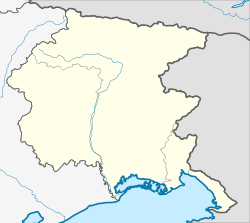Prosecco (Italian: [proˈsekko]; Slovene: Prosek)[1] is a village near the city of Trieste, Italy. It is best known for giving the name to the wine Prosecco.[2] It lies 249 metres (817 feet) above sea level.[3]
Prosecco
Prosek (Slovene) | |
|---|---|
 | |
| Coordinates: 45°42′27″N 13°44′01″E / 45.70750°N 13.73361°E | |
| Country | Italy |
| Region | Friuli-Venezia Giulia |
| Municipality | Trieste |
| Population (2011) | |
• Total | 1,349 |
| Area code | 040 |
Name
editProsecco was attested in written sources in 1308 as Prossecho (and as Prosec in 1372, Prossegk in 1421, and Proseck and Prosseck in 1494). The name is of Slovene origin, derived from the dialect common noun prosek 'path cut through the woods' (cf. standard Slovene preseka or poseka, standard Serbian/Croatian is prosek). The wine Prosecco was named after the village, and this wine name was later borrowed from Italian into Slovene and Croatian as prošek.[1]
Population
editThe population in the central area of the locality is still mainly Slovene; it was 92% Slovene before the annexation of Austrian Littoral to Italy in 1920 and subsequent Italianization.[4] The newer part of the locality known as Borgo San Nazario, built in the 1950s and 1960s, is mainly inhabited by Istrian Italians who left Istria after the end of World War II.[5]
References
edit- ^ a b Snoj, Marko (2009). Etimološki slovar slovenskih zemljepisnih imen. Ljubljana: Modrijan. p. 335.
- ^ Crawford, Elisabeth Antoine (2009). Flavors of Friuli: A Culinary Journey Through Northeastern Italy. San Francisco: Equilibrio, p. 223.
- ^ Lang, Helmut (2009). Friaul-Julisch Venetien. Munich: Bergverlag Rother GmbH, p. 165.
- ^ Spezialortsrepertorium der Oesterreichischen Laender. VII. Oesterreichisch-Illyrisches Kuestenland. Wien, 1918, Verlag der K.K. Hof- und Staatsdruckerei.
- ^ Pertti Ahonen; et al. (2008). People on the move: forced population movements in Europe after WWII and its aftermath. Berg. p. 107. ISBN 9781845208240.
External links
edit- Media related to Prosecco at Wikimedia Commons

